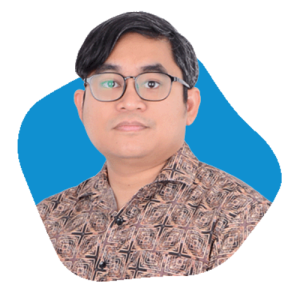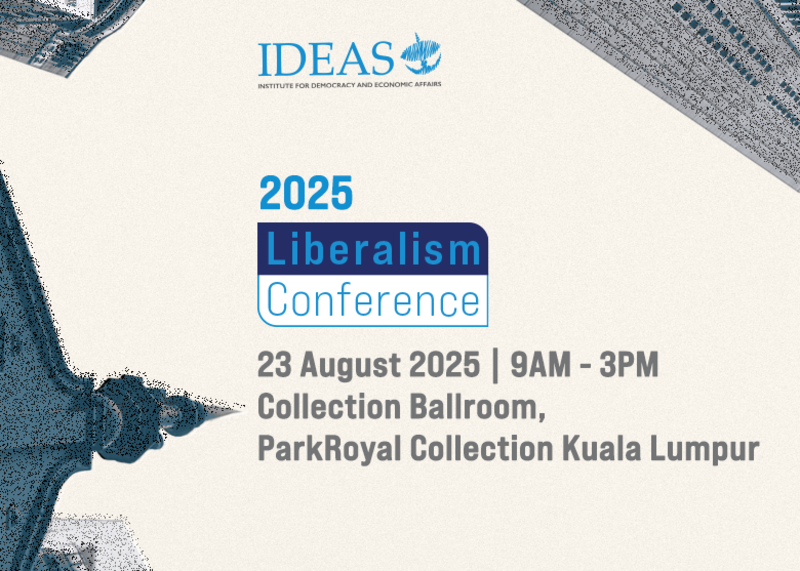Around the world, liberal democracy is under strain. Trust in institutions is weakening. Polarisation is deepening. Values that once formed the backbone of democratic governance, such as the rule of law and public accountability are being questioned.
For Malaysia, these shifts present real and urgent questions. Can liberal ideas still offer a path forward in a diverse and complex society? How can we protect pluralism, fairness and freedom in times of political and economic uncertainty?
The IDEAS Liberalism Conference 2025 offers a platform for open, practical dialogue on how to uphold liberal democratic values in an increasingly divided yet interconnected world.
Plenary Panel Discussion: What Happened to Liberal Democracy?
Liberal democracy was built on institutions, pluralism, and cooperation. Today, those ideas are being questioned. This session explores how liberal democracies around the world are responding and what Malaysia can learn from these shifts.
Panelists:

Katrin Bannach
Country Director, Malaysia & IndonesiaFriedrich Naumann Foundation for Freedom
Katrin Bannach has led the Indonesia and Malaysia Office of the Friedrich-Naumann-Foundation for Freedom (FNF) since August 2025, following senior roles in the South Caucasus, Sub-Saharan Africa, Middle East and North Africa, and Southeast Asia. She headed FNF offices in Thailand, Myanmar, Malaysia, and Cambodia, expanding democracy promotion efforts even under military rule, and worked on human rights and conflict resolution in South Asia. Katrin studied Sociology, International Law, and Training Psychology in Hamburg, Germany, and South Africa. She has also published on development policy and regional affairs, and is a Certified Professional Coach.

Prof Chin-Huat Wong
Deputy Head (Strategy)Sustainable Development Solutions Network Sunway University
Prof Wong is a political scientist at Sustainable Development Solutions Network (SDSN) Asia Office, Sunway University. Trained as a comparativist in University of Essex, UK, he specialises in electoral system and party system. Wong’s expert on constituency delimitation and anti-hopping law, his research interests cover electoral system, party system and parliamentary democracy. Wong’s political insights are featured in international and domestic media in English, Malay and Chinese including Sinar Harian, Malaysiakini, South China Morning Post and Project Syndicate.

Dr Tricia Yeoh
Associate Professor of PracticeSchool of Politics and International Relations University of Nottingham Malaysia
Dr Tricia Yeoh is Associate Professor of Practice at the University of Nottingham Malaysia’s School of Politics and International Relation. She is also Visiting Senior Fellow at the ISEAS-Yusof Ishak Institute, Senior Fellow at the Asia Pacific Foundation of Canada and Senior Adjunct Research Fellow at Monash University Malaysia. Formerly CEO of the Institute for Democracy and Economic Affairs (IDEAS) Malaysia, she has almost 20 years of experience in national and subnational public policy advocacy, engaging with and within academia, civil society, government, and the private sector. Her research and practice have focused on federalism, subnational opposition politics, institutional reforms, comparative politics, governance and public policy.
Dr Tricia holds a PhD in Political Science from the University of Nottingham Malaysia, an MSc in Research Methods in Psychology from the University of Warwick, and a Bachelor in Business and Commerce from Monash University Malaysia. She serves on the board of IDEAS Autism Centre and is a certified yoga teacher.
Moderator:

Aira Azhari
Chief Executive OfficerIDEAS
Aira Azhari is the Chief Executive Officer (CEO) of IDEAS, where she works across the organisation to amplify, connect and advocate the work that IDEAS does to stakeholders in government, politics, the private sector and general public.
She has been interviewed by the BBC (World News and Radio), Al Jazeera, Astro Awani, Bernama, Channel News Asia, Radio Televisyen Malaysia, Lite FM and BFM on matters relating to Malaysian politics, international relations, economics and governance. Her op-eds have appeared in The Malaysian Insight, Malay Mail Online, The Edge, Utusan Malaysia and Sinar Harian.
She is an alumnus of the Friedrich Naumann Foundation’s International Academy for Leadership in Gummersbach, Germany, the Global Institute for Tomorrow’s Malaysian Young Leaders Programme, the US Department of State’s International Visitor Leadership Programme (Transparency and Accountability in Government), and the Fulbright Professional Exchange Program in New York and Washington DC.
She graduated with a Master of Laws in Public International Law from the London School of Economics and Political Science in December 2015.
Concurrent Breakout Sessions
Session 1: Tackling Inequality in Liberal Societies
Liberalism has long supported free markets and open competition, but growing inequality is raising hard questions. Can we build an economy that is both free and fair? This session will explore how Malaysia can shape a more inclusive approach that remains open to innovation while ensuring more people benefit. We will discuss how liberal principles can adapt to meet today’s challenges without losing their core.
Panelists:

Shakira Teh Shariffudin
Senior Economist, People/Human Development World Bank
Shakira Teh Sharifuddin joined the World Bank in 2016 and is currently a Senior Economist with the People/Human Development Vice Presidency at the World Bank Inclusive Growth and Sustainable Finance Hub in Kuala Lumpur. Her work focuses on issues related to female labor force participation, childcare provision, social protection, education reform, learning loss and recovery, and adult skills assessment. Previously, Shakira was part of the Macroeconomics, Trade, and Investment Global Practice at the Bank, where she led the publication of the Malaysia Economic Monitor.
Before joining the World Bank Group, Shakira worked as an economist at Bank Negara Malaysia and was briefly attached to the International Monetary Fund in Washington, D.C. She is currently a part-time PhD candidate in the Sociology of Education at the University College London (UCL). She is also a proud mother of 7-year-old autistic twin boys.
Moderator:

Dr Stewart Nixon
Deputy Director of ResearchIDEAS
Stewart is IDEAS’ Deputy Director of Research, leading its economic and social policy research and engagement. He has extensive experience in public policy research, analysis, and advice from a career spanning the Australian Government Treasury, OECD, East Asian Bureau of Economic Research, and World Bank. He is a passionate contributor to policies supporting Malaysia’s sustainable and inclusive economic development, particularly its international integration, clean energy transition, and economic resilience dimensions.
Stewart holds a Doctor of Philosophy (in Economics), a Master of Advanced Studies, and bachelor’s degrees in economics and psychology from the Australian National University.
Session 2: Can We Still Trust Institutions?
Liberalism has long supported free markets and open competition, but growing inequality is raising hard questions. Can we build an economy that is both free and fair? This session will explore how Malaysia can shape a more inclusive approach that remains open to innovation while ensuring more people benefit. We will discuss how liberal principles can adapt to meet today’s challenges without losing their core.
Panelists:

Ibrahim Suffian
Co-Founder & Programs DirectorMerdeka Center for Opinion Research
Ibrahim Suffian is a co-founder and programs director of Merdeka Center for Opinion Research, a leading public opinion polling and political surveys organization that has worked with and maintained close rapport across the entire Malaysian political spectrum. Through Merdeka Center, Ibrahim has been involved in organizing surveys in Indonesia, Thailand, Philippines, Brunei, Singapore and Myanmar. Ibrahim received education from the Kelley School of Business at Indiana University and obtained an MBA from the Eli Broad College of Business at Michigan State University. Ibrahim was a World Fellow at Yale University in 2011 and is presently a visiting fellow at the Malaysian Institute for Strategic and International Studies.

Aziff Azuddin
Research DirectorrIMAN Research
Aziff Azuddin is the Research Director at IMAN Research, where he leads projects at the intersection of politics, society, and community resilience. He has steered major projects including Orang Kita: Malay Politics of Acknowledgement and Resentment and its follow-up study Kami Orang Sini Juga: Non-Malay Politics of Under-representation and Disillusionment, which examine youth political aspirations, inter-ethnic relations, and the rise of right-wing movements in Malaysia. With over a decade of experience in media, public policy, and urban sociology, Aziff’s research has informed policymakers, civil society, and international partners.
He is currently pursuing a PhD at the University of Nottingham Malaysia, where his work explores how Malayness and Muslim identities are governed and negotiated in urban spaces, bridging scholarship and practice to advance inclusive, forward-looking policy solutions.
Moderator:

Amalina Annuar
Research ManagerIDEAS
Amalina Annuar is IDEAS’ Research Manager, overseeing Democracy & Governance and Social Policy research and engagement. She brings seven years of humanitarian and child-protection experience from two UN agencies. Most recently, as Child Protection Officer at UNICEF Malaysia, she led social-norms and behaviour-change initiatives to prevent violence against children. A Chevening Scholar Alumni, Amalina earned an MSc in Evidence-Based Social Intervention and Policy Evaluation from the University of Oxford and a BSc in Social Science (Social Work Studies) from University Malaysia Sarawak.
Through meta-analysis, policy synthesis, and sociological insight, she turns research into clear, practical strategies—from participatory governance to inclusive social policy—that empower marginalised communities and advance social justice in Malaysia.



